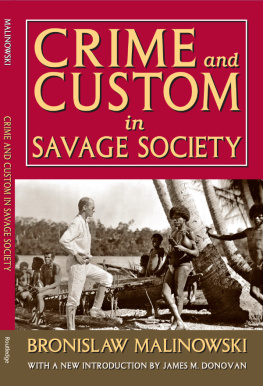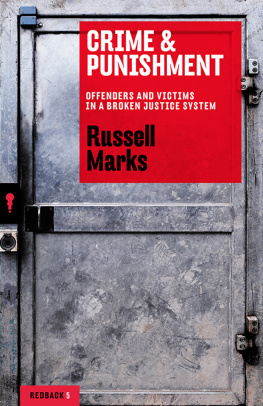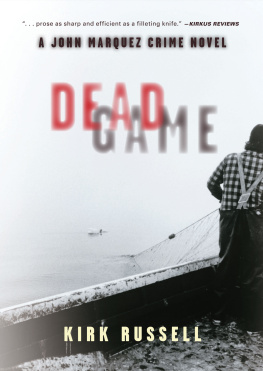For M.C.M.
First published 2002 by Ashgate Publishing
Reissued 2018 by Routledge
2 Park Square, Milton Park, Abingdon, Oxon OX14 4RN
711 Third Avenue, New York, NY 10017, USA
Routledge is an imprint of the Taylor & Francis Group, an informa business
Copyright Australian Institute of Criminology 2002
All rights reserved. No part of this book may be reprinted or reproduced or utilised in any form or by any electronic, mechanical, or other means, now known or hereafter invented, including photocopying and recording, or in any information storage or retrieval system, without permission in writing from the publishers.
Notice:
Product or corporate names may be trademarks or registered trademarks, and are used only for identification and explanation without intent to infringe.
Publishers Note
The publisher has gone to great lengths to ensure the quality of this reprint but points out that some imperfections in the original copies may be apparent.
Disclaimer
The publisher has made every effort to trace copyright holders and welcomes correspondence from those they have been unable to contact.
A Library of Congress record exists under LC control number: 2002016499
ISBN 13: 978-1-138-74179-9 (hbk)
ISBN 13: 978-1-315-18267-4 (ebk)
Mr Sitesh Bhojani
Until his appointment on 6 November 1995 as a Member of the Australian Competition and Consumer Commission, Mr Bhojani was (from 1992 to 1995) a barrister with a general commercial and civil litigation practice at the independent bar in Western Australia, In 1994 he was appointed an Associate Commissioner of the Trade Practices Commission and has also been Deputy Chairman of the Law Council of Australia, Business Law Section's Trade Practices Committee.
From 1986 to 1992 he was a barrister and solicitor with the Commonwealth Attorney-General's Department, Perth office, and also with the Trade Practices Unit of the Australian Government Solicitor/Federal Court and Tribunals Registry.
In June 1991, and subsequently in June 1994, Mr Bhojani completed the Negotiation Workshop and the Advanced Negotiation Workshop respectively at the Program of Instruction for Lawyers at Harvard Law School, Harvard University.
He holds a Bachelor of Science (Monash) and Bachelor of Laws (Monash). In 1986 he was admitted as barrister and solicitor in Victoria and Western Australia. He has also tutored in trade practices law at the University of Western Australia.
Mr Bhojani's responsibilities on the Commission include its enforcement activities (as Chairman of the ACCC's Enforcement Committee), the professions, the health sector and small business initiatives. He regularly represents the Commission in negotiations and mediation of ACCC litigation.
Ms Sophie Curzon Blencowe
Sophie Curzon Blencowe is a Research Fellow at the Key Centre for Ethics, Law, Justice and Governance at Griffith University, in Queensland. She holds the degrees of BA (Hons) and LLB (Hons) from the University of Melbourne and received the 1992 Jessie Mary Vasey Prize for her honours thesis in women's history. She was also awarded the Dwight's Prize for the Final Examination in Arts, School of History in 1992, and the Sir George Turner Exhibition for Constitutional and Administrative Law in 1993. Together with Charles Sampford, she is the author of 'Educating Lawyers to be Ethical Advisers' in Economides, K. (ed.) 1998, Ethical Challenges to Legal Education and Conduct, Oxford University Press, Oxford.
Mr Graham Brooks
Graham Brooks is a lecturer in community justice in the School of Social Work and Social Policy at the University of Birmingham, England, where he teaches trainee probation officers. Previous work has included research into the effectiveness of local, social juvenile programs to reduce offending; the relationship between drinking/drug habits and violence; and measuring the success of probation service employment schemes to reduce recidivism. Whilst such research is diverse, a personal leitmotiv of his work is the social control of the 'body' and the 'elective affinity' between work and discipline. Recently this interest has moved away from offenders to look at the construction of 'professional deviance' and the control and regulation of 'criminal justice practitioners'.
Ms Anne-Louise Carlton
Anne-Louise Carlton has worked for State Departments of Health and Community Services in both New South Wales and Victoria since 1978. Her qualifications include undergraduate degrees in Arts (majoring in Psychology and Law) and Social Work, from Sydney University, an MBA from Monash University and, more recently, a Bachelor of Science (Clinical Studies) from Victoria University. Her work in the public service has included almost 20 years in the Intellectual Disability field, both in line management and policy, where she was actively involved in closing institutions such as Caloola, and in managing the state-wide establishment of community-based programs. More recently, Ms Carlton's work as Manager of the Practitioner Regulation Section has included reviews of occupational regulation legislation under National Competition Policy, including reviews of Victorian legislation governing optometrists, chiropractors, osteopaths, physiotherapists, medical practitioners and nurses. She has been responsible for the research and policy development work that led to the passage of the Victorian Chinese Medicine Registration Act 2000 . She is currently responsible for implementation of that Act, as well as reviewing the Victorian Pharmacists Act, the Medical Practice Act and the Nurses Act. Since starting work on a review of Chinese medicine, Ms Carlton now deals with many of the policy issues that arise in relation to complementary therapies.
Ms Margaret M. Coady
Margaret Coady is a Senior Lecturer in the Education Faculty at the University of Melbourne, She has held positions as Visiting Research Scholar at the Centre for Human Values, Princeton University, the Rockefeller Research Center at Bellagio, Italy, and the Joseph and Rose Kennedy Institute of Ethics at Georgetown University. Her research interests are in professional ethics, in rights of children and in state regulation of groups such as families and professions which demand a degree of autonomy. She has read papers on these topics at a number of universities in the United States, England, China, Singapore and South Africa, and has published on these topics in international journals. She is the Program Manager in Professional Ethics for the Australian Research Council Special Research Centre in Applied Philosophy and Public Ethics.
Ms Carla Day
Carla Day is currently completing doctoral studies on compliance and decision-making in complex organisations at the Australian National University. She was previously Director of the Fraud Control Policy and Ethics Directorate within the Inspector General Division of the Australian Defence Organisation. Her role there was to manage a Defence-wide awareness program in ethical resource management, conduct research, and develop and implement fraud control policy within the Defence organisation. She is a registered psychologist who is a trained facilitator and has a broad background in health administration, management, counselling, and social and educational research.










